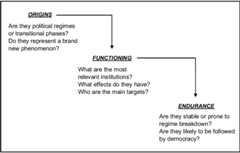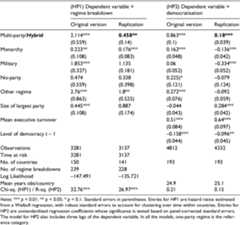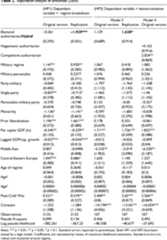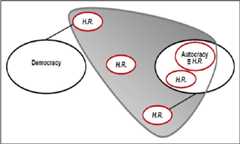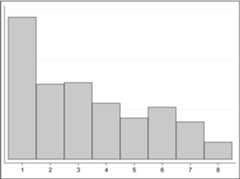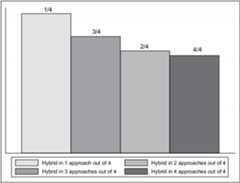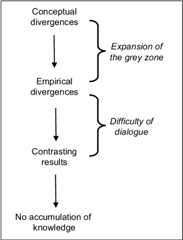DOI:10.1177/0192512113495756 - Corpus ID: 144881011
Hybrid what? Partial consensus and persistent divergences in the analysis of hybrid regimes
@article{Cassani2014HybridWP, title={Hybrid what? Partial consensus and persistent divergences in the analysis of hybrid regimes}, author={Andrea Cassani}, journal={International Political Science Review}, year={2014}, volume={35}, pages={542 - 558}, url={https://api.semanticscholar.org/CorpusID:144881011}}- A. Cassani
- Published1 November 2014
- Political Science
- International Political Science Review
Despite initial scepticism about their very existence, hybrid regimes have increasingly attracted scholarly attention. The rapid development of the debate, however, is in striking contrast with its often inconclusive results. The goals of this article are to identify the causes of this impasse and to seek a solution for it. In particular, the article focuses on a crucial point of contention: how to define hybrid regimes. The analysis shows why divergences on this issue hamper dialogue among…
Figures and Tables from this paper
66 Citations
What Do We Know about Hybrid Regimes after Two Decades of Scholarship?
- M. Mufti
- 2018
Political Science
In two decades of scholarship on hybrid regimes two significant advancements have been made. First, scholars have emphasized that the hybrid regimes that emerged in the post-Cold War era should not…
Mobilizing in a hybrid political system: the Artvin case in Turkey
- Hayriye OzenBurak Doğu
- 2020
Political Science
ABSTRACT Hybrid political systems, which are neither rigorously liberal nor authoritarian, create ambiguous political environments for protests and social movements. We argue in this study that the…
The fallacy of constructing hybrid political orders: a reappraisal of the hybrid turn in peacebuilding
- Roger Mac GintyOliver P. Richmond
- 2016
Political Science
ABSTRACT This article reviews the recent academic and policy interest in hybridity and hybrid political orders in relation to peacebuilding. It is sceptical of the ability of international actors to…
Civil Society in Hybrid Regimes: Trade Union Activism in Post-2003 Iraq
- B. Isakhan
- 2021
Political Science, Sociology
This article explores the relationship between hybrid regimes and civil society. It examines the extant debate between ‘neo-Tocquevilleans’ and their opponents over whether or not a robust civil…
Dual agent of transition: how Turkey perpetuates and challenges neo-patrimonial patterns in its post-Soviet neighbourhood
- Ole FrahmK. Hoffmann
- 2020
Political Science
ABSTRACT As hybrid regimes persist, we need to better understand their behaviour in international affairs. Concentrating on business actors, we use a qualitative study of Turkey's foreign relations…
Revolution without regime change: The evidence from the post-Euromaidan Ukraine
- Yuriy Matsiyevsky
- 2018
Political Science
The great convergence: post-Cold War transitions to hybrid regimes across waves and ebbs
- A. Cassani
- 2024
Political Science
Abstract The ‘waves and ebbs’ model proposed by Huntington in his 1991's The Third Wave has profoundly shaped how scholars interpret global trends of democratization and autocratization, but has also…
The Influence of the Resource Wealth on the Transformations in Competitive Authoritarian Regimes
- K. Chmel
- 2017
Political Science
As a result of the absence of a firm agreement, the discussions about the political regime classifications appear on a scientific agenda and causes, even more, controversy. The minimalist concept of…
Overlooked forms of non-democracy? Insights from hybrid regimes
- Claudio Balderacchi
- 2022
Political Science
Abstract In the last two decades, significant advances have characterised the study of hybrid political regimes. Yet, when distinguishing democratic from non-democratic varieties, this field has…
Aid Sanctions and Hybrid Regimes
- Clara PortelaJuan S. Mora-Sanguinetti
- 2025
Political Science
Abstract Recent advances combining sanctions scholarship and the study of authoritarianism relate sanctions effectiveness to regime type. These studies generally conclude that economic sanctions tend…
...
68 References
Regime-Hybridity in Developing Countries: Achievements and Limitations of New Research on Transitions
- Heidrun Zinecker
- 2009
Political Science
Research on transitions has reached a crossroad. Should it be abandoned because the third wave of transitions to democracy has ended, or should it continue because so much remains unaccounted for…
Beyond Authoritarianism: The Conceptualization of Hybrid Regimes
- L. GilbertPayam Mohseni
- 2011
Political Science
This paper appraises the state of the field on hybrid regimes by depicting the tensions and blurred boundaries of democracy and authoritarianism “with adjectives.” An alternative conceptualization…
Are there hybrid regimes? Or are they just an optical illusion?
- Leonardo Morlino
- 2009
Political Science
In recent years there has been growing interest and a related literature on hybrid regimes. Is there a good definition of such an institutional arrangement? Are there actually sets of stabilized,…
DEMOCRACY AND DICHOTOMIES: A Pragmatic Approach to Choices about Concepts
- D. CollierR. Adcock
- 1999
Political Science
▪ Abstract Prominent scholars engaged in comparative research on democratic regimes are in sharp disagreement over the choice between a dichotomous or graded approach to the distinction between…
Democracy Challenged: The Rise of Semi-Authoritarianism
- M. Ottaway
- 2002
Political Science
During the 1990s, international democracy promotion efforts led to the establishment of numerous regimes that cannot be easily classified as either authoritarian or democratic. They display…
Beyond the Radial Delusion: Conceptualizing and Measuring Democracy and Non-democracy
- J. MøllerSvend-Erik Skaaning
- 2010
Political Science
Typologies of political regimes in general and of democracy in particular proliferate in the literature. However, few efforts have been devoted to systematically scrutinizing the empirical…
Political Participation and Regime Stability: A Framework for Analyzing Hybrid Regimes
- Joakim Ekman
- 2009
Political Science
In past decades a number of countries that have moved away from outright authoritarianism have not transformed into democracies, but rather into regimes that combine democratic and non-democratic…
Democracy with Adjectives: Conceptual Innovation in Comparative Research
- D. CollierS. Levitsky
- 1997
Political Science
The recent trend toward democratization in countries across the globe has challenged scholars to pursue two potentially contradictory goals. On the one hand, they seek to increase analytic…
Gradations of Democracy? Empirical Tests of Alternative Conceptualizations
- Zachary Elkins
- 2000
Political Science
measured. Should scholars use intermediate categories to measure differences between democratic and nondemocratic regimes? In a series of influential studies, Przeworski, Alvarez, Cheibub, and…
Elections Without Democracy: The Rise of Competitive Authoritarianism
- S. LevitskyLucan Way
- 2002
Political Science
The post–Cold War world has been marked by the proliferation of hybrid political regimes. In different ways, and to varying degrees, polities across much of Africa (Ghana, Kenya, Mozambique, Zambia,…
...
Related Papers
Showing 1 through 3 of 0 Related Papers
